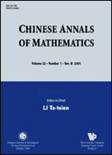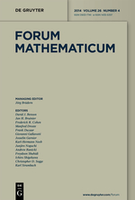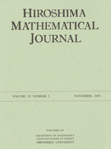
Russian Mathematics
Scope & Guideline
Advancing the Frontiers of Mathematics
Introduction
Aims and Scopes
- Functional Analysis and Differential Equations:
Research on functional spaces, operator theory, and differential equations is a primary focus, exploring solutions and properties of various types of equations, including linear and nonlinear forms. - Approximation Theory and Numerical Methods:
The journal features significant contributions to approximation theory, including polynomial approximation, numerical methods for solving differential equations, and stability analysis of numerical schemes. - Mathematical Modeling and Applications:
Papers often involve mathematical modeling in applied fields such as physics, engineering, and biology, demonstrating how mathematical techniques can be used to solve real-world problems. - Algebraic Structures and Their Applications:
Research on algebraic structures, including semigroups, algebras, and Lie groups, is prevalent, often linking these structures to broader mathematical theories and applications. - Complex Analysis and Function Theory:
The journal includes studies on complex functions, integral equations, and boundary value problems, contributing to the understanding of complex analysis and its applications. - Geometric Analysis and Topology:
Exploration of geometric and topological aspects of mathematical structures, including studies on manifolds, curvature, and geometric flows, is a notable feature. - Stochastic Processes and Mathematical Logic:
Emerging themes in stochastic analysis and mathematical logic highlight the intersection of probability theory with other mathematical disciplines.
Trending and Emerging
- Nonlinear Dynamics and Chaos Theory:
An increasing number of papers focus on nonlinear dynamics and chaos, reflecting the growing interest in understanding complex systems and their behaviors. - Machine Learning and Data Analysis Techniques:
The integration of machine learning methodologies and data analysis into mathematical research is on the rise, indicating a significant trend towards interdisciplinary approaches. - Fractional Calculus and Its Applications:
Research on fractional calculus has gained momentum, with applications extending into various fields, including physics and engineering, highlighting its relevance in modern mathematical analysis. - Advanced Numerical Methods and Computational Mathematics:
There is a noticeable trend towards the development of sophisticated numerical methods for solving complex mathematical problems, particularly in applied contexts. - Mathematical Biology and Ecology Modeling:
Emerging themes in mathematical biology and ecological modeling indicate a growing interest in applying mathematical techniques to biological systems and population dynamics.
Declining or Waning
- Classical Geometry and Trigonometry:
Research in classical geometry and basic trigonometric methods appears to be decreasing, possibly due to the growing focus on more abstract and higher-dimensional mathematical theories. - Elementary Number Theory:
Papers focusing on elementary number theory, while still present, are less frequent, reflecting a potential shift towards more complex and applied mathematical problems. - Traditional Combinatorial Problems:
There seems to be a waning interest in traditional combinatorial problems, with fewer contributions compared to the past, as researchers gravitate towards more abstract algebraic and topological topics. - Basic Statistical Methods:
While statistical methods remain important, the journal has seen a decline in basic statistical analyses, suggesting a move towards more advanced probabilistic models and applications. - Foundational Studies in Logic:
The foundational studies in mathematical logic, although crucial, have become less prominent, possibly overshadowed by applied logic and computational aspects.
Similar Journals

CHINESE ANNALS OF MATHEMATICS SERIES B
Advancing Mathematical Frontiers with Regional InsightsCHINESE ANNALS OF MATHEMATICS SERIES B, published by Shanghai Scientific Technology Literature Publishing House, is a prominent journal dedicated to fostering research and development in the field of mathematics. With an ISSN of 0252-9599 and an E-ISSN of 1860-6261, this journal provides a platform for the dissemination of innovative mathematical theories and methodologies. As of 2023, it is categorized within the Q4 quartile in *Applied Mathematics* and has achieved a commendable Q3 rank in *Mathematics (miscellaneous)*, emphasizing its growing influence in academia. Despite not being an open-access publication, it serves as a valuable resource for researchers, professionals, and students seeking to explore diverse mathematical topics, particularly from a unique regional perspective. The journal's extensive publication history—from 1980 and continuing to 2024—demonstrates a longstanding commitment to advancing mathematical knowledge and providing insights into various disciplines related to mathematics.

FORUM MATHEMATICUM
Exploring the Depths of Mathematical InnovationFORUM MATHEMATICUM, published by WALTER DE GRUYTER GMBH, is a distinguished academic journal based in Germany, known for its significant contributions to the field of mathematics. With an ISSN of 0933-7741 and an E-ISSN of 1435-5337, the journal features comprehensive studies ranging from applied mathematics to diverse mathematical disciplines. Having maintained a commendable presence since 1989, FORUM MATHEMATICUM has achieved notable classification rankings, including Q2 in Applied Mathematics and Q1 in miscellaneous Mathematics as of 2023. Additionally, it holds a Scopus rank within the top 60th percentile in General Mathematics, making it a prominent platform for researchers and professionals seeking rigorous analysis and innovative methodologies in mathematics. While the journal does not currently offer open access, its rich content is pivotal for advancing mathematical theory and applications, appealing to students and seasoned academics alike.

Glasnik Matematicki
Cultivating Excellence in Mathematical ResearchGlasnik Matematicki is a prestigious academic journal published by the Croatian Mathematical Society, focusing on a broad spectrum of topics within the field of mathematics. Established in Croatia, this journal has gained recognition for its contributions to the mathematical community, providing a platform for researchers and scholars to share their groundbreaking findings and innovative theories. The journal operates without an open access model, encouraging traditional subscription-based readership, which enhances its standing among journals in the field. With a respectable impact factor and categorized in the Q3 quartile for mathematics (miscellaneous) as of 2023, Glasnik Matematicki is vital for those engaged in advanced mathematical research and education. It aims to disseminate significant mathematical advancements and facilitate scholarly exchange, making it an essential resource for students, professionals, and researchers alike. The journal’s convergence period from 2006 to 2024 marks its ongoing commitment to academic excellence and its relevance in contemporary mathematical discourse.

CUBO-A Mathematical Journal
Connecting Researchers in the World of MathematicsCUBO-A Mathematical Journal, published by the Department of Mathematics and Statistics at Universidad de La Frontera in Chile, stands as a significant Open Access resource in the field of mathematics since its inception in 2011. With an ISSN of 0716-7776 and an E-ISSN of 0719-0646, this journal invites submissions that explore a wide spectrum of mathematical disciplines, including Algebra, Number Theory, Analysis, Geometry, Topology, and Logic. Although currently positioned in the Q4 category across various mathematical domains and registered at Rank #223/399 in General Mathematics in Scopus, CUBO serves as a valuable platform for emerging researchers and practitioners to disseminate their findings. Operating under a continuous commitment to accessibility, CUBO fosters an inclusive academic environment that supports the exchange of innovative ideas vital to advancing mathematics. The journal's target audience encompasses a diverse community of researchers, professionals, and students eager to participate in the expanding dialogue within mathematical sciences.

Proceedings of the Institute of Mathematics and Mechanics
Connecting Ideas, Cultivating Knowledge in MathematicsProceedings of the Institute of Mathematics and Mechanics is a pivotal journal in the field of mathematics, dedicated to the advancement and dissemination of cutting-edge research in various sub-disciplines. Published by INST MATHEMATICS & MECHANICS, NATL ACAD SCIENCES AZERBAIJAN, this journal plays a significant role in bridging local and international research communities. With an ISSN of 2409-4986 and E-ISSN of 2409-4994, it has gained recognition, attaining a Q3 ranking in the Miscellaneous Mathematics category and placing in the 67th percentile on Scopus. Run from 2017 to 2024, the journal serves as an accessible platform for scholars and practitioners, inviting contributions that advance theoretical knowledge and practical applications in mathematics. With an emphasis on quality and innovation, the Proceedings of the Institute of Mathematics and Mechanics stands out as a vital resource for those looking to stay at the forefront of mathematical research and its multifaceted applications in various fields.

Mediterranean Journal of Mathematics
Bridging Theory and Practice in the World of MathematicsThe Mediterranean Journal of Mathematics, published by SPRINGER BASEL AG, is a prominent platform dedicated to the advancement of mathematical research and education. Since its inception in 2004, this journal has been pivotal in disseminating high-quality research across various fields of mathematics, currently holding a notable Q2 ranking in the miscellaneous mathematics category as of 2023. With its ISSN 1660-5446 and E-ISSN 1660-5454, the journal enjoys a respected position in the academic community, evident by its Scopus rank of 129 out of 399 in General Mathematics, placing it in the 67th percentile. While primarily a subscription-based journal, it remains committed to providing a comprehensive resource for researchers, professionals, and students, fostering dialogue and exploration within the mathematical sciences. The Mediterranean Journal of Mathematics, based in Basel, Switzerland, continues to contribute significantly to the evolution of mathematical theory and practice, marking its relevance as we approach its 20th anniversary in 2024.

Hiroshima Mathematical Journal
A Legacy of Mathematical Research and DiscoveryThe Hiroshima Mathematical Journal, published by Hiroshima University, Graduate School of Science, serves as a prominent platform for disseminating high-quality research in the field of mathematics. Established in 1959, the journal has been an integral part of the mathematical community, focusing on areas such as Algebra, Number Theory, Analysis, and Geometry and Topology. Although currently classified in Q4 quartile rankings within its categories, the journal is committed to advancing mathematical knowledge and fostering scholarly dialogue. Its accessibility, combined with its long-standing history, makes it an essential resource for researchers, professionals, and students dedicated to exploring and enhancing the mathematical sciences. For those interested in contributing or accessing cutting-edge research, the Hiroshima Mathematical Journal continues to uphold its mission of excellence in mathematical scholarship.

Ufa Mathematical Journal
Fostering Scholarly Dialogue for a Global Mathematical CommunityUfa Mathematical Journal, published by the Institute of Mathematics and Computer Center in Russia, is an esteemed platform dedicated to the dissemination of high-quality research in the field of mathematics. With its ISSN 2074-1863 and E-ISSN 2074-1871, the journal serves as a vital resource for mathematicians, researchers, and academicians seeking to explore innovative methodologies and findings in various mathematical domains. Although presently operating under a subscription model, the journal’s commitment to advancing mathematical knowledge is underscored by its rigorous peer-review process and its aim to contribute significantly to the global mathematical community. With a focus on original research articles, the Ufa Mathematical Journal plays an essential role in fostering scholarly dialogue and collaboration among professionals in the field.

Lithuanian Mathematical Journal
Unveiling New Horizons in MathematicsLithuanian Mathematical Journal is a prominent academic publication that has been advancing the field of mathematics since its inception in 1973. Published by SPRINGER, this journal provides a platform for researchers, professionals, and students to disseminate their findings and engage with the latest developments in various branches of mathematics. With an ISSN of 0363-1672 and an E-ISSN of 1573-8825, it is accessible to a global audience, primarily serving as a hub for mathematical discourse and innovation. Despite its current categorization in Q4 within the miscellaneous mathematics category and holding a Scopus rank of #284 out of 399, the journal continuously aims to elevate its impact by contributing to significant mathematical research. The importance of this journal lies not only in its rigorous peer-review process but also in its commitment to fostering academic collaboration and knowledge exchange in a structured yet dynamic environment.

Bulletin of the Iranian Mathematical Society
Elevating the discourse in mathematics, one article at a time.The Bulletin of the Iranian Mathematical Society, published by SPRINGER SINGAPORE PTE LTD, is a distinguished journal dedicated to advancing the field of mathematics. With an ISSN of 1017-060X and E-ISSN 1735-8515, this journal has established a valuable platform for researchers and scholars to disseminate their findings from 2008 to 2024. The journal is categorized in the Q2 tier of Mathematics (miscellaneous) for 2023, showcasing its importance and relevance in the mathematical community, ranked #169 out of 399 in General Mathematics with a 57th percentile standing in Scopus. While currently operating under a subscription model, it remains an essential resource for professionals and students seeking cutting-edge research and developments in various domains of mathematics. The Bulletin aims to bridge theoretical research and practical application, thereby enriching both academia and industry.